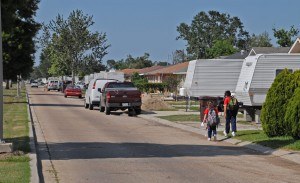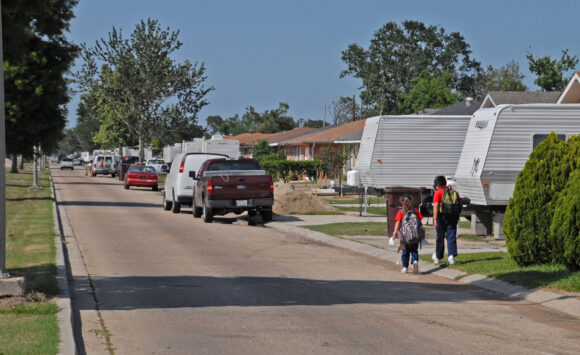A class-action settlement agreement has been reached to resolve nearly all the remaining court claims over allegations that government-issued trailers exposed Gulf Coast residents to hazardous fumes after Hurricane Katrina, a lead plaintiffs’ attorney said Monday.
In a court filing late Monday, plaintiffs’ lawyers and several companies that manufactured FEMA trailers after the 2005 storm asked U.S. District Judge Kurt Engelhardt to approve an expanded version of a multimillion-dollar deal initially announced in April.

A separate agreement with four FEMA contractors that installed or refurbished trailers will be filed Tuesday, lead plaintiffs’ attorney Gerald Meunier told The Associated Press.
Nearly two dozen FEMA trailer makers agreed last month to pay a total of $14.8 million to resolve claims over elevated formaldehyde levels in FEMA trailers following hurricanes Katrina and Rita.
Monday’s expanded settlement agreement includes claims against trailer manufacturers Gulf Stream Coach Inc., Forest River Inc., Jayco Inc. and Monaco Coach Corp. Representatives of the four companies didn’t immediately respond to emails seeking comment.
FEMA contractors Shaw Environmental Inc., Bechtel Corp., Fluor Enterprises Inc. and CH2M Hill Constructors Inc. also have reached agreements with the plaintiffs’ lawyers, according to Meunier and a lawyer for the contractors.
Contractors’ attorney David Kurtz said the companies are proud of the roles they played in response to Katrina.
“We agree, however, that all of the parties are best served by settling this matter and saving the time and expense of further litigation,” Kurtz added.
The amount of money that would be paid by each of the eight companies wasn’t immediately disclosed.
Residents of Louisiana, Texas, Alabama and Mississippi who lived in FEMA trailers after the 2005 hurricanes are eligible to participate.
Engelhardt is expected to hold a fairness hearing on the proposed settlement on Sept. 27. If he approves the deal, a group of Texas residents’ claims against the Federal Emergency Management Agency would be the only formaldehyde-related claims that haven’t been settled or dismissed by the judge, Meunier said.
Meunier estimates that roughly 60,000 plaintiffs could benefit from the entire settlement. He said the deal is a “positive development” for residents even if the amount of compensation is lower than many had anticipated when the case started nearly five years ago.
“But I think the outcome here reflects the realities of the case,” Meunier said.
Meunier said the plaintiffs’ lawyers tested a sample of FEMA trailers but couldn’t test every unit occupied by every plaintiff.
“I think that presented a challenge,” he said. “It was our belief that to go on trying thousands of cases with that kind of challenge in presenting the evidence … was not going to be a very satisfactory alternative for the clients.”
Daniel Balhoff, a court-appointed mediator who helped broker the proposed settlement with FEMA trailer makers, said in a court filing Monday that he believes the deal is “fair, adequate and reasonable.”
“The plaintiffs are faced with significant burden of proof issues with respect to causation,” he said. “For many plaintiffs, the manufactured home no longer exists or can no longer be located. Further, many individual plaintiffs faced causation problems due to the fact that they were smokers or had independent bases separate from formaldehyde exposure for their health issues.”
Formaldehyde, a chemical commonly found in building materials, can cause breathing problems and is classified as a carcinogen. Government tests on hundreds of trailers in Louisiana and Mississippi found formaldehyde levels that were, on average, about five times what people are exposed to in most modern homes.
FEMA, which isn’t a party in the settlement, downplayed formaldehyde risks for months before those test results were announced in February 2008. As early as 2006, trailer occupants began reporting headaches, nosebleeds and difficulty breathing.
The federal agency provided trailers or mobile homes to more than 144,000 families after the hurricanes. Plaintiffs’ lawyers have accused the trailer makers of using shoddy building materials and methods in a rush to meet the agency’s unprecedented demand for temporary housing.
In October 2007, Engelhardt was picked to oversee hundreds of consolidated lawsuits and tens of thousands of related claims. Since then, the case has generated more than 25,000 docket entries and resulted in three trials for individual claims. The juries in all three trials sided with the companies and didn’t award any damages.
The settlement isn’t the first in the litigation. Last year, a group of companies that manufactured mobile homes for FEMA after Katrina agreed to pay $2.6 million to resolve thousands of related claims. Mobile homes are larger and sturdier than travel trailers, which housed the majority of storm victims and are more prone to elevated levels of formaldehyde.
Fleetwood Enterprises Inc., which supplied FEMA with travel trailers before it filed for bankruptcy in 2009, agreed in 2010 to a settlement resolving about 7,500 to 8,000 claims. Terms of that deal weren’t disclosed.
Engelhardt dismissed claims against FEMA by residents of Louisiana, Mississippi and Alabama. Plaintiffs’ attorneys have asked the 5th U.S. Circuit Court of Appeals in New Orleans to overturn Engelhardt’s dismissal of the Louisiana claims. The appeals court previously upheld his dismissal of the Mississippi and Alabama claims.
Was this article valuable?
Here are more articles you may enjoy.


 Canceled FEMA Review Council Vote Leaves Flood Insurance Reforms in Limbo
Canceled FEMA Review Council Vote Leaves Flood Insurance Reforms in Limbo  Founder of Auto Parts Maker Charged With Fraud That Wiped Out Billions
Founder of Auto Parts Maker Charged With Fraud That Wiped Out Billions  UBS Top Executives to Appear at Senate Hearing on Credit Suisse Nazi Accounts
UBS Top Executives to Appear at Senate Hearing on Credit Suisse Nazi Accounts  Portugal Rolls Out $2.9 Billion Aid as Deadly Flooding Spreads
Portugal Rolls Out $2.9 Billion Aid as Deadly Flooding Spreads 